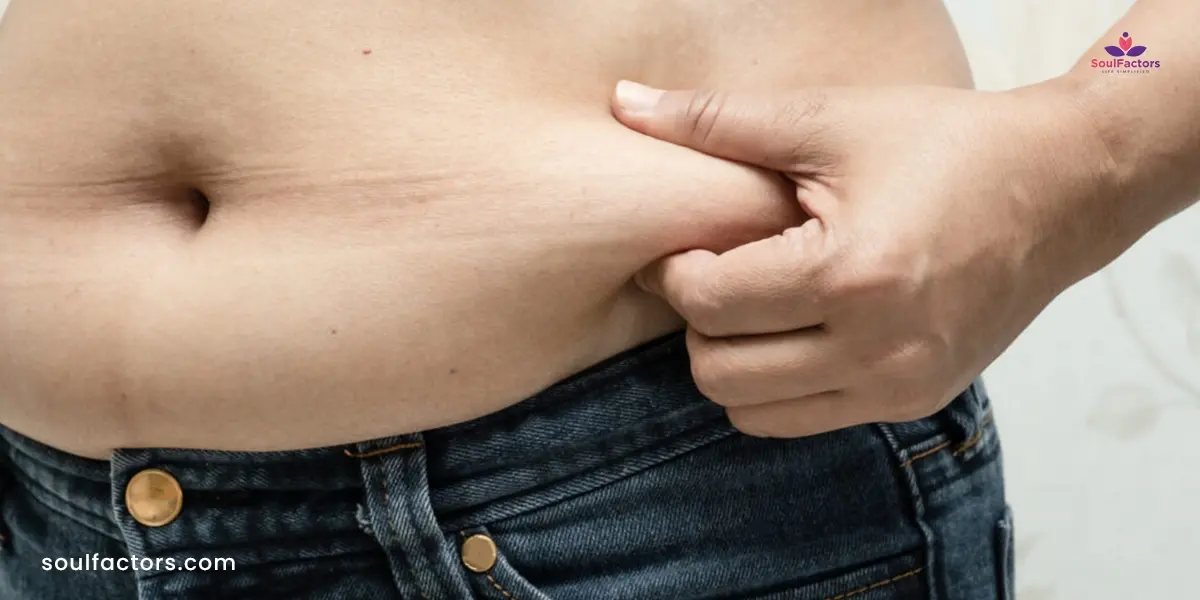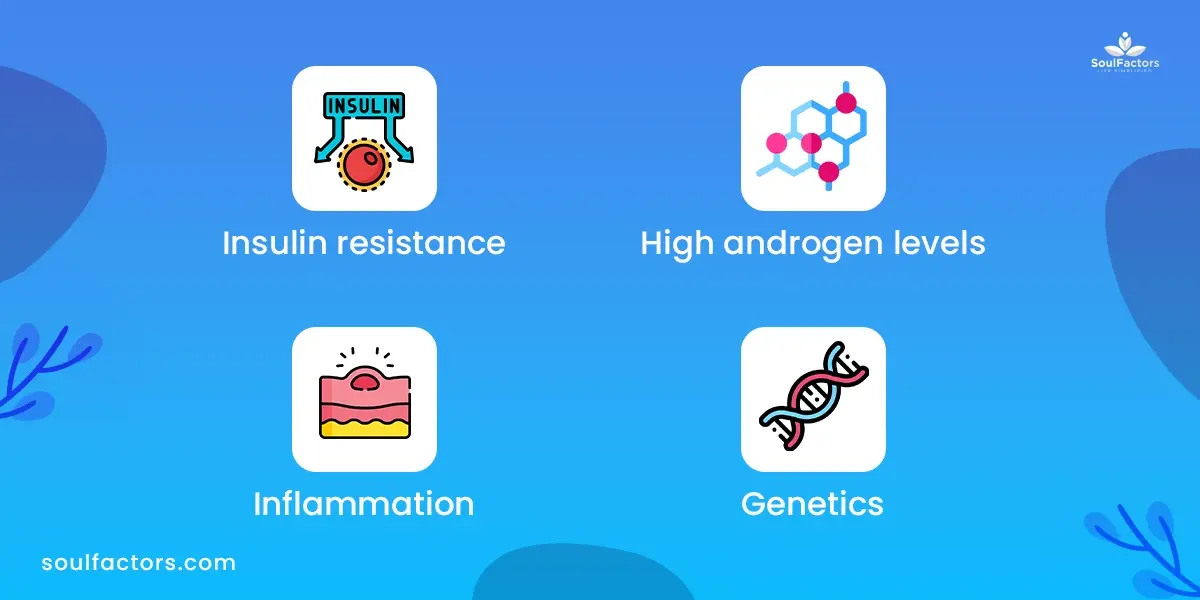PCOS Belly: Know What It Looks Like And How To Get Rid Of It
Are you struggling with a PCOS belly? Discover the truth about its appearance and effective ways to banish it for good!
On Sep 19, 2023 – 10 minutes read

Talk to a woman living with PCOS, and she will tell you about the numerous symptoms she struggles with on a regular basis. One of the most annoying symptoms that women with PCOS wish they never had to deal with is a PCOS belly.
For all those of you who have no clue what a PCOS belly is, we have curated this write-up discussing the details of this common women’s problem. You can also use it as a guide in case you’re wondering if that bulge of yours is a PCOS belly and how you can reduce it. So, let’s begin!
What Is A PCOS Belly, And What Are Its Causes?
Polycystic Ovary Syndrome, or PCOS, is a fairly prevalent condition affecting 6%–12% of women in the United States (1). The condition mainly affects females in reproductive age and is characterized by the development of small fluid-filled cysts in the ovaries of a woman. Hence the name Polycystic Ovary Syndrome. However, some women may not develop cysts even if they are diagnosed with the condition.

Women with PCOS experience several symptoms, some of which include missed or irregular periods, infertility, acne, and excess body hair. Out of the many symptoms that arise due to this condition, PCOS belly, or PCOS stomach, is a prominent one. Although not all women who have PCOS have this symptom, those who do have a tough time dealing with it.
“PCOS belly,” as we call it, is a term used to describe the buildup of excess fat in the abdominal area of women with PCOS. Weight gain in the stomach area, along with bloating, together give the tummy an apple-shaped appearance, aka a PCOS belly.
Possible Causes Of PCOS Belly
There are three main reasons for having excess fat deposition around the middle of the waist in PCOS-affected women:

Insulin resistance: It is a condition in which your body cells don’t respond well to insulin, a hormone that regulates blood glucose levels in the body. People who are insulin-resistant have high glucose levels in the blood and have a higher chance of developing Type 2 diabetes, cardiovascular issues, and other health problems in the future.
High androgen levels: Women with PCOS have elevated levels of androgens, also called the “male hormones,” like testosterone in their bodies. This also triggers the deposition of fat in the waist area.
Inflammation: PCOS is often associated with inflammation in the body. It further stimulates the ovaries to produce more androgens in the body, which ultimately leads to a beer belly.
Genetics: PCOS runs in families. So, if your mom or sister has this condition, you are more likely to develop it at some point in your life due to hereditary factors.
Can PCOS Cause A Big Tummy?
Even though it’s not what you were hoping to hear, yes, women with PCOS usually have a big tummy. Your body mass index has a little role to play here because women with lean bodies and a normal BMI also tend to have fat deposition in their midsection if they have PCOS. This primarily happens because of the spike in androgens in their bodies. Because men are more likely to have bigger tummies, a rise in male hormones in the female body also results in a similar effect.
How Can You Determine If You Have A PCOS Belly?
One indicator that can tell you if you have a PCOS belly is your waist-to-hip ratio. To find its value, use a measuring tape to measure your waist and hip circumferences. Divide the two to determine your waist-to-hip ratio. If you obtain a value higher than 0.87, your large belly may be a result of undiagnosed PCOS.

In such cases, it is better to go for a doctor’s consultation. It will clear your doubts and help you get better clarity on your health. While there is no specific diagnostic test for PCOS, your doctor will carry out a range of assessments to arrive at a conclusion.
You can expect him to ask you about your family history, menstrual cycle, lifestyle, and more. You may be advised to get a blood test to check for elevated levels of androgens in the body and a pelvic ultrasound to check for the presence of cysts in your ovaries. Your doctor will then review your reports and arrive at a conclusion on whether or not you have PCOS.
What Does A PCOS Belly Look Like?
Central obesity, or weight gain in the abdomen, is the hallmark of PCOS. This leads to an increase in waist circumference and gives it a round and enlarged appearance. Therefore, women with a PCOS belly likely fall into the category of apple-shaped bodies. This body type has even body weight in the hips, thighs, and chest but shows weight gain in the tummy, especially in the lower abdomen.
Another characteristic of the PCOS belly is that it is a result of visceral fat accumulation in the belly and around various organs in the abdominal cavity. This type of fat gives the abdomen a tight-looking appearance and typically feels hard and firm when touched. It is quite the opposite of subcutaneous fat, which is comparatively soft and easy to lose with diet control and exercise.
Are There Any Risks Of PCOS Belly And Related Weight Gain?
Deposition of excess fat in the tummy area and surrounding organs puts women with PCOS belly at a greater risk of developing a host of health problems. These include:
Infertility or Subfertility:
Cysts in the ovaries and excess weight can hinder ovulation and reduce the fertility of a woman, lowering her chances of getting pregnant.
Diabetes Risk:
Insulin resistance, which is generally associated with PCOS stomach, can lead to increased blood glucose levels (2). When these levels remain elevated for a long time, it can put you at risk of developing diabetes.
Cardiovascular Problems:
Excess belly fat is known to affect heart health. Hence, women with PCOS who have visceral fat deposition primarily in the abdominal region are more prone to cardiovascular problems (3).

Hypertension:
120/80 mm Hg is considered the ideal blood pressure for an individual. However, PCOS can elevate your blood pressure in the long term and lead to hypertension.
Sleep Apnea:
High levels of androgens, or male hormones, in the body can cause sleep apnea, a disorder in which the person’s breathing frequently pauses and restarts while they are sleeping.
Anxiety And Depression:
Women with PCOS may struggle with body image issues and other problems linked to it. This can increase their anxiety levels and may even push them toward other mental health problems like depression.
How To Get Rid Of PCOS Belly?
As we mentioned earlier, PCOS belly is all visceral fat, so getting rid of it sure is challenging. But with the kind of issues it creates for you in the long run, it is better to take measures to control it as soon as you have a diagnosis.
While you may not see significant visible changes in your enlarged tummy immediately, you will eventually reap its benefits and make yourself healthier. It will boost your confidence and help you feel better by alleviating its symptoms and reducing your chances of developing other health problems linked to it.
I. Exercises for PCOS Belly
Exercise is a great way to keep a check on the never-ending cycle of fat deposition in your PCOS stomach. Although regular exercise may not completely eliminate your enlarged belly, it will improve your body’s sensitivity to insulin and regulate hormonal imbalances, which will ultimately promote weight loss in the abdominal area and other parts of the body.

Guidelines suggest that women with PCOS should get 150 minutes of moderate-intensity exercise per week. So, you can easily break this down into 30-minute sessions five days a week, with two days of active rest.
Exercises you can try to bring your PCOS belly shape back to normal are:
Cardio Exercises:
Brisk walking, cycling, jogging, and running are some great cardio exercises to improve your fitness levels and burn the excess fat around your tummy. You can even do at-home cardio workouts if you don’t have the time to go out. As a complete beginner, you can start with low-intensity cardio workouts and gradually do higher-intensity workouts as you gain strength and stamina.
HIIT Workouts:
High-Intensity Interval Training, or HIIT workouts, are very efficacious in burning calories and reducing body fat. It involves performing exercises in short bursts and taking rest in between. If you exercise regularly and have the strength to handle a high-intensity workout, you can add exercises like jumping jacks, burpees, and mountain climbers to your workout routine.
Strength Training:
Core-strengthening exercises like side planks, leg raises, and bicycle crunches are all good for targeting your core and burning the fat stored in your belly. You can also include some full-body strength training exercises like squats and lunges and use resistance bands or dumbbells to help build muscle mass.
Yoga And Pilates:
As PCOS can bring along stress and hamper your mental well-being, adding yoga and pilates to your weekly workouts can be beneficial. It will improve your flexibility, help you manage stress, and balance out your disrupted hormones.
Dance Workouts:
Zumba, hip-hop, and other dance workouts are very popular these days and are fun ways of targeting belly fat. Include dance in your workouts if dancing has always been your forte. But even if you’ve never really danced before, don’t shy away from giving it a try if you’re bored of doing regular exercises at the gym.
II. Tips For Managing PCOS Belly
Here are a few tips to manage PCOS belly fat and relieve its symptoms:
1. Eat a high-fiber diet to regulate insulin resistance and reduce belly fat.
2. Add anti-inflammatory foods like olive oil, whole grains, and fatty fish to your diet.
3. Include foods like chicken, eggs, meat, etc., in your meal plan to provide your body with enough protein. It will stabilize your blood glucose level and stop you from unnecessary snacking.
4. Sleep for no less than 7-8 hours daily to manage your hunger hormones and keep your food intake under control.
5. Practice meditation and other relaxation techniques to reduce stress, as stress increases cortisol levels in your body and leads to weight gain.
6. Practice portion control for weight management. By doing so, you won’t end up overeating.
7. Stay hydrated throughout the day to promote digestion and reduce bloating.
III. Meal Plan And Foods To Avoid
Eating right and exercising do take care of your increased waistline, but if you wish to reduce PCOS belly fat further, there are certain foods you must completely avoid. They are:
- Refined carbs like white bread and pastries
- Fried foods, for example, fried chicken and French fries
- Sugary drinks like colas and sports beverages
- Processed foods like cookies and pies
- Saturated fats such as margarine, cheese, and mayonnaise
- Excess red meat
- Excess coffee and alcohol

In addition, you should follow a special meal plan that aims to give your PCOS belly shape a more flattened look. Here is a sample meal plan to give you an idea:
Breakfast: Oatmeal bowl/ Greek yogurt parfait/ Eggs and veggies/ Spinach and black bean burrito/ Omelet muffins
Mid-morning Snack: Pear/ Hard-boiled eggs/ Handful of nuts/ Granola bar/ String cheese
Lunch: Grilled chicken and Caesar salad/ Tofu salad/ Apple and chicken kale wraps/ Salmon salad/ Quinoa bowl
Evening Snack: Cucumber and carrots with hummus/ Wholegrain crackers with tomatoes and cheese/ Strawberries and yogurt/ Apple slices and peanut butter/ Orange slices
Dinner: Baked salmon/ Brown rice with steamed vegetables/ Chicken fajita bowl/ Pesto chicken whole meal pasta/ Lentil and veggie soup
The key to conquering belly fat due to PCOS is consistency. Exercising and eating a PCOS diet every now and then is not going to bring you the results you desire. If you really want your belly to get back in shape and live a healthy life, you must stick to your workouts and eat healthily regularly. Consulting a dietician with professional knowledge of the PCOS diet can help you plan out your food intake based on your personal dietary preferences and requirements.
Final Thoughts
PCOS affects a woman’s quality of life in many ways. In addition to fighting with its symptoms day in and day out, she also goes through many psychological, emotional, and social challenges. Living with obesity, hair loss, acne, and excessive facial and body hair is no fun. Plus, menstrual irregularities and fertility issues can further bring down confidence.
But the good news is that medications, exercise, diet modifications, lifestyle changes, and lots of positive attitude can help women with PCOS live healthier and fuller lives.
Before we end this blog post, there’s one thing we would like to remind you of. Although it is good to know about PCOS belly fat and gather information on how you can address this issue, you must never forget to seek advice from your healthcare provider.
As PCOS is a medical condition, getting yourself evaluated by a doctor is the first thing you must do if you suspect you have a PCOS belly. A timely examination by your doctor will help confirm the problem so you can take the next steps to tackle it head-on and move forward on the path of a happy and healthy life.

Subscribe to Newsletter
Elevate your routine, stay on trend, and embrace a personalized beauty journey with our curated insights.







Write a Comment